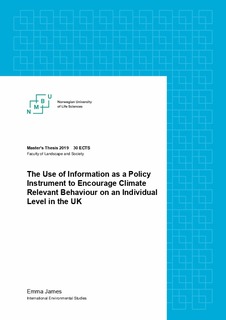| dc.description.abstract | Household consumption behaviours in the UK are contributing to the greenhouse gas emissions driving the climate crisis. Policies in the UK implement climate change mitigation efforts; however, these instruments are often unable to influence a behaviour change. This project aims to investigate the use of information as a policy instrument to encourage climate relevant behaviour on an individual level in the UK. The research will investigate barriers, impact and normative information disclosure, and communication within a group as potential influencing aspects for adopting climate relevant behaviour. The institutional theory, the norm activation theory, the functional theory, and the deliberative democratic theory will be used to understand the influence of these aspects. Focus groups were the main data collection method, along with a commitment strategy for participants to decide to adopt climate relevant behaviours. Four of the focus groups presented impact information and two of the focus groups presented both impact and normative information. Follow-up focus groups and questionnaires were used to assess participant experiences. In total, 25 participants took part in this investigation. All 25 participants committed to adopt climate relevant behaviours. The barriers identified and the perceptions of the information seem to be influenced by individual preferences, moral obligations to act promoted by personal norms, and preferences of other individuals. The majority of participants experienced barriers, the most significant being the social (family) barriers. Perceptions of the impact and normative information were mixed among participants. However, normative information was not perceived as confusing and seemed to be more engaging than the format of impact information. Communication within the group and the group setting itself seemed to have the most significant influence because of discussion and pressure within the group stimulating moral obligations and motivations to act. It is suggested that combining group communication with relatable normative information could form an appropriate policy instrument to encourage climate relevant behaviour on an individual level in the UK. | nb_NO |

